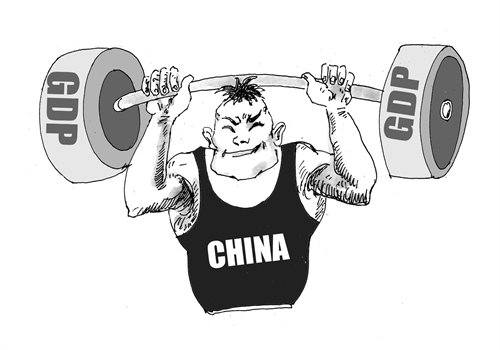China to chart path ahead with new five-year plan
Experts discuss relevance, importance of economic strategy

Illustration: Luo Xuan/GT
Editor's Note:
China is going to hold the Fifth Plenary Session of the 18th Communist Party of China Central Committee in October, during which the 13th Five-Year Plan will be discussed. Five-year plans were first introduced by the Soviet Union, and later adopted by other communist countries including China and Vietnam. China has increasingly embraced the market economy and top leaders have pledged to let the market play a decisive role in the economy. But the country is still guided by a series of five-year plans. Critics of economic planning believe that government intervention could undermine efficiency, while advocates say that it helped China weather the global financial crisis. So the question is, does China need a national economic plan as it moves toward a market-oriented economy? This edition of the business comment section will explore the issue from the perspective of Chinese and international experts.
Akshay Mathur, director of research at Gateway House in India
Planning will always be required. Even the US, which is considered to be a market-based economy, uses economic plans. Planning is different from control. Any country that moves from a centrally controlled economy to a market economy makes the shift in two ways. One is a crisis-based situation that is destructive and changes are forced upon a country. India did this in 1992 and it almost led to a crisis. The other way is to make changes gradually. The Chinese government will have to see how to liberalize different parts of its economy while retaining control of some other parts. It is doing that through various practices such as the Qualified Foreign Institutional Investor program and allowing yuan clearing services in offshore areas such as Frankfurt and Singapore. It is also doing this under what it calls the "new normal." Only time can tell whether this incremental way will work or not. India is also gradually moving away from a controlled economy. In some cases, India is ahead of China in market operation. Our stock exchanges, companies and insurance industry are market-driven. The key for ensuring the effectiveness of planning is to promote transparency and accountability.
Yusuf Isik, adviser to the president of the Republican People's Party in Turkey
Planning is very important for Turkey even though it has been a market economy for a long time. It is one of the few countries that has kept a national planning organization. It not only helped in the 1960s but also in modern times. The modern economy needs some guidance because of the large amount of investment we have to make. In Turkey, the economy is driven by the private sector, but the state also supports development via planning. It distributes infrastructure investment more rationally, in accordance with demand from the people and the economy.
For China, after having grown very fast, it has generated very high savings and investment rates. It is now entering a stage in which there is more sophisticated guidance of the economy and more weight given to the market, with the plan being implemented less directly than before. That will be useful for China to remain competitive.
Sergey A. Afontsev, director of the Economic Theory Department at the Institute of World Economy and International Relations in Russia
Those who propose that Russia should go back to the planned economy are either political idealists or populists who try to exploit sentiment against the correct trend in the Russian economy. Most Russian experts and decision-makers realize that the idea of going back to the planned economy is incompatible with Russia's existing economic system and cannot address growth problems facing the country. Of course, these proposals make a lot of noise and attract publicity, but they are not practical.
What is amazing about China is that it has succeeded in merging some ideas and policy lines that were considered incompatible by most Western economists. Of course, it is up to the political scientists to decide how the political system of China generates such a result. But for me as an economist, it is about yin and yang. China is a specialist in combining some ideas and decisions that seems to be contradictory, but they address different aspects of reality. China succeeded in developing a market economy while at the same time keeping part of the economy in State-operated sectors.
I'm pretty sure China will continue this policy in the future. The major challenge is how to improve the efficiency of the State-managed sectors and get rid of the least efficient State-owned enterprises.
It is also crucially important for the Chinese government to do something about the recent trend in its stock market, which made many people around the world, in my country in particular, feel concerned about the growth prospects of Chinese markets.
We do know there are bubbles in China's stock market and perhaps even greater bubbles in the housing market. But we also know the Chinese government has experience in addressing these bubbles and preventing them from bursting. It is important for the Chinese government to send clear signals that these bubbles are manageable and that there will be no sudden crisis in China's economy.